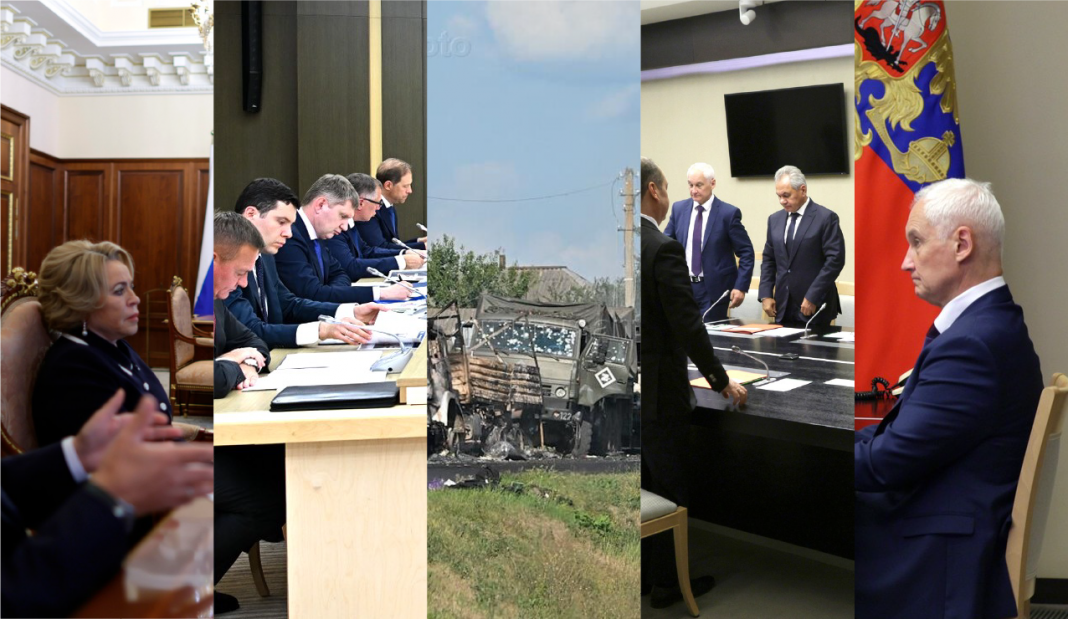This report presents key events that had an important impact on political, economic and social processes inside Russia.
Based on the results of the past week, the following trends can be identified in the following thesis:
- Putin is trying to show active interaction between the presidential vertical and legislative structures. In this situation, a television picture is created: the president gathers the heads of the Federation Council and the State Duma and gives them a farewell for the fall session, indicating the priority of certain issues to be considered by the deputies. The working meeting thus turns into an informational message.
- Apparently, Russia will not announce mobilization and will not withdraw troops from the front line. Putin has managed to pull up reserves, with the help of which he is trying to squeeze Ukrainian troops from the territory of Kursk region. The AFU has so far achieved a rather modest success – 7 to 10 small settlements are under the control of the AFU, the capture of the district center of Suja (less than 5 thousand people) has not been possible – the city is in the operational semi-envelope. Raids are being made deep into the region.
- Putin’s decision not to raise the status of the so-called “special military operation” to “anti-terrorist operation” or to declare a state of war has played its role in the process of keeping calm and order in Russia. They decided to make do with a “counterterrorist operation” in a separate area of the Kursk region. Obviously, there will be conclusions and personnel purges, but after the completion of the operation in Kursk region.
This digest discusses the following issues that were most relevant to Russia during the period from August 5 to August 11:
- The entry of the Armed Forces of Ukraine into the territory of the Kursk region of the Russian Federation;
- Vladimir Putin’s meeting with Federation Council Speaker Valentina Matvienko and State Duma Speaker Vyacheslav Volodin;
- Meeting with members of the Russian government;
- Meeting with heads of security agencies;
- Vladimir Putin’s telephone conversation with the General Secretary of the Central Committee of the Communist Party of Vietnam, President of the Socialist Republic of Vietnam Tho Lam;
- Meeting with permanent members of the Security Council;
- Oleg Deripaska’s interview for Nikkey Asia.
This Content Is Only For Subscribers
- Entry of the Ukrainian Armed Forces into the Kursk region of the Russian Federation
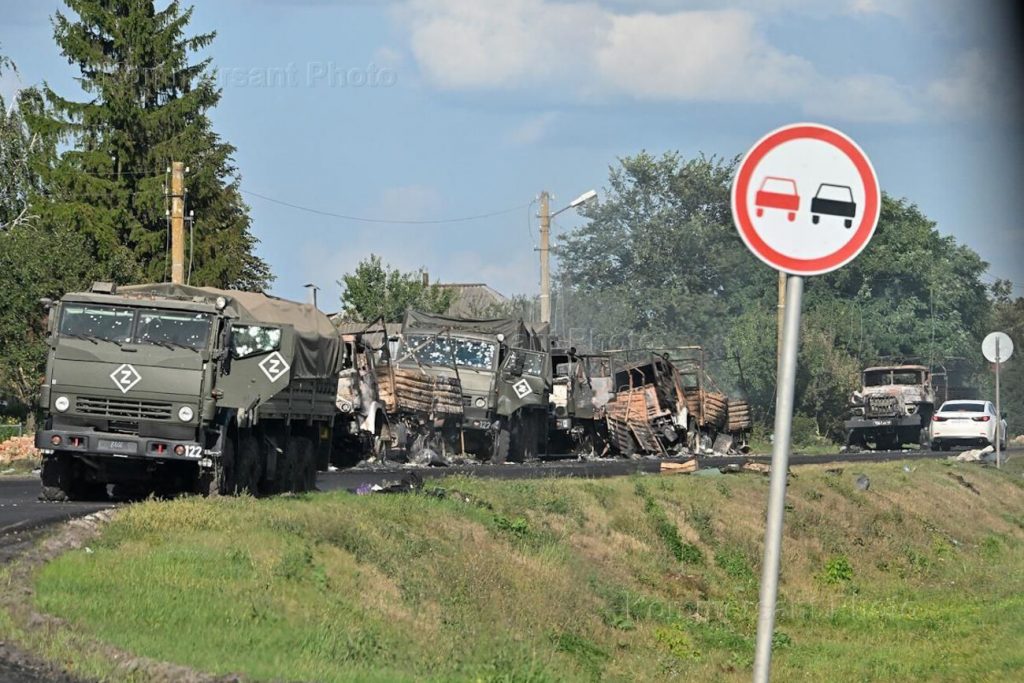
On Tuesday, August 6, the Ukrainian Armed Forces crossed the border into the Kursk region of the Russian Federation and began a gradual advance into Russian territory north of the Ukrainian city of Sumy. It is noteworthy that in this case not volunteer formations or foreign (Russian) mercenaries were involved, but directly the Ukrainian military, and Western equipment and weapons were also actively used.
Hours later, the White House called Ukraine’s invasion a legitimate act of self-defense. National Security Council spokesman John Kirby said in Washington that the attack was not contrary to US policy, that the US would continue to allow Ukraine to use Pentagon-supplied weapons “to combat immediate threats on the other side of the border.”
The very next day, it was reported that the Ukrainian military had seized a gas-measuring station located in the border area, which is the exact entrance from Russia to Ukraine of the Urengoy-Pomary-Uzhgorod gas pipeline, the only route that carries Russian gas to Europe. Later, videos confirming the presence of Ukrainian military near the gas distribution station in the town of Suja were also published. At the same time, the level of gas pumping through the pipeline has not decreased.
As of Sunday, August 11, the situation in the Kursk region continues to develop. Due to the lack of reliable information, data on the number of captured settlements is difficult to establish, although both sides confirm the capture of at least seven villages in the border zone.
Outcomes/Predictions:
As of today, it is too early to assess the Ukrainian Armed Forces’ operation in Kursk Oblast, as the operation in itself, as a stand-alone entry into Russian territory, does not make sense. It is expected that the entry into the territory of the Kursk region is part of a larger plan, a more grandiose plan. The regime of “semi-silence” in the media partially confirms this. Neither the actual scale of the controlled territory, nor the number of Ukrainian troops, nor the number and type of weapons used in the operation are known.
In any case, this operation has an important media effect – primarily in the West, which has recently almost resigned itself to Ukraine’s defeat. Now Ukraine has shown that it is ready for unexpected decisions and has a lot of “surprises” in its arsenal. Inside the Russian Federation, the situation has not changed: Putin’s ratings have not decreased, the number of supporters of the continuation of the war has increased, and most citizens believe that the situation is not Putin’s fault, but the generals who embezzled funds to strengthen defense capabilities. There is a new demand for repression among the generals.
Russia will not declare mobilization and will not withdraw troops from the front line. Putin has managed to pull up reserves, with the help of which he is trying to squeeze Ukrainian troops from the Kursk region. The AFU has so far achieved a rather modest success – 7 to 10 small settlements are under the control of the AFU, the capture of the district center of Suja (less than 5 thousand people) has not been possible – the city is in the operational semi-envelope. Raids are being made deep into the region.
- Vladimir Putin’s meeting with Federation Council Speaker Valentina Matvienko and State Duma Speaker Vyacheslav Volodin
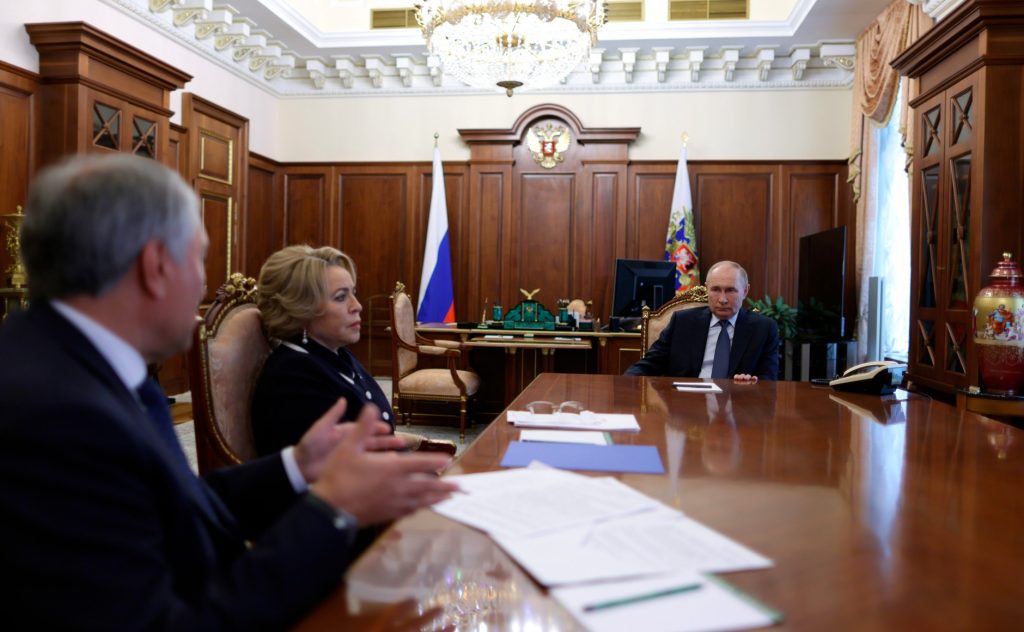
On Monday, August 5, Vladimir Putin met with Federation Council Speaker Valentina Matvienko and State Duma Speaker Vyacheslav Volodin in the Kremlin. The official reason for the meeting was summarizing the results of legislative work in the spring session. In particular, the Russian president thanked the parliament for the work done and prompt resolution of important issues. The parties also discussed plans for the new political season.
Key talking points:
- Matvienko: “Under your leadership during all this difficult time, we really worked as one team – both the Government, the Federation Council and the State Duma – harmoniously. We often argued, we debated over laws, we made amendments, but in the end we always found understanding in the interests of better laws”.
- Matvienko: “You have already said the figure – 331 laws, the main priority for us was, of course, the implementation of the President’s Address to the Federal Assembly, your May decrees on national development goals until 2030, and in a number of areas – until 2036. The Federation Council approved its plan to implement the provisions of the Address. We have not only fulfilled it, but also exceeded it, supplementing it along the way. And in this regard, we have focused primarily on the problems that you set out in your Address and the May decrees.
- Matvienko: “We paid a lot of attention to changes in the tax system. We made a lot of amendments, and in fact our proposals and others were accepted, the Ministry of Finance was very receptive. I would say it was a social contract between the government and society, it was very calmly received, because the instructions you gave – a fairer taxation system – it certainly did not hurt the bulk of families. Moreover, within the framework of these tax changes, families with children and other categories of low-income citizens received additional privileges and additional support”.
- Matvienko: “It is clear that the Federation Council is a chamber of the regions, consisting of representatives of the regions, so we focused, of course, on interaction with the regions. We are in constant contact with governors, with legislative assemblies. And we have become a regional platform – I believe this is very important for a federal state – where we discuss any appeals from the regions, proposals, changes in legislation on this platform and prepare systemic solutions. I will not list them all – there have been many such systemic solutions, and they have been formalized in laws.
- Matvienko: “Vladimir Vladimirovich, I would like to thank you separately for your decision to write off two-thirds of the debt of the constituent entities of the Federation in the form of budget loans. It is a very good support. Whichever governor I meet with, they are very happy, because these are funds that will be used for development, for modernization of infrastructure and will help the development of the regions in a targeted way.
- Volodin: “This session was special for us, because for the first time in modern Russia, the State Duma participated in the formation of the Government. You have initiated the transfer of the authority to approve ministers, deputy prime ministers and the Prime Minister to our citizens, who approve them in their positions through their deputies.”
- Volodin: “Of course, an important law is in terms of improving the tax system. We held open large parliamentary hearings, invited representatives of civil society and the expert community. The government was practically with us around the clock at that time, we conducted this dialog. I must emphasize that this allowed us to make the law better. Initially, it was criticized. But the ability to hear, including the Government, the deputies – because, I emphasize, it’s a different relationship, they used to brush it off, they used to not come [to the hearings], now they don’t – has certainly affected the quality of work.”
- Volodin: “And if we talk about the parliament, again, despite the fact that we faced sanctions and problems, again during the election campaign you confirmed that it is right to do so. And deputies, faction leaders have taken it very positively. It complements the responsibility. We have consolidation on key issues of the country’s development, be it economic issues or defense issues, and, most importantly, international issues”.
- Volodin: “If we talk about the session, it is still special, because despite the fact that it is a very complicated issue in terms of resources and for a long time they could not solve it, but there was a request – we were constantly traveling to the regions, answering voters’ questions: when will the government return to the indexation of pensions for working pensioners? And I want to express my gratitude to you from all political factions of the State Duma, from our citizens”.
Outcomes/Predictions:
Putin is trying to show active interaction between the presidential vertical and legislative structures. In this situation, a television picture is created: the president gathers the heads of the Federation Council and the State Duma and gives them a farewell for the fall session, indicating the priority of certain issues to be considered by the deputies. The working meeting thus turns into an informational message.
- Meeting with members of the Russian government
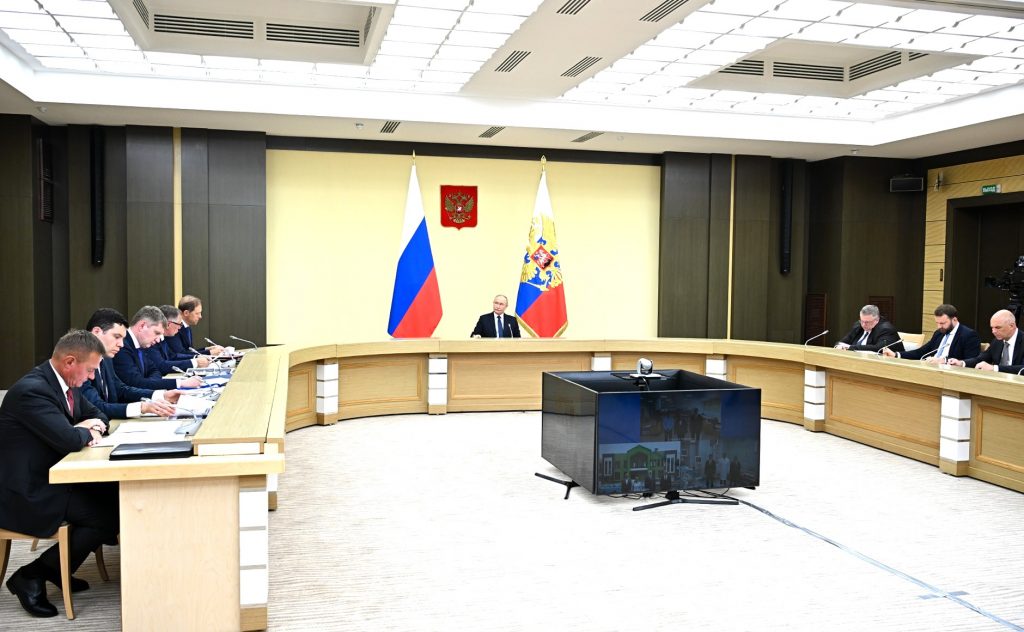
On Wednesday, August 7, Vladimir Putin held a meeting with members of the Russian government at the Novo-Ogaryovo residence. The main topics of the meeting were stated to be the development of the infrastructure industry, as well as the development of the manufacturing industry. At the same time, the Russian president also paid much attention to the events in the Kursk region, where the advance of Ukrainian forces continues.
Key talking points:
- Putin: “As is known, the ‘Kiev regime’ has undertaken another large-scale provocation, firing indiscriminately from various types of weapons, including missiles, at civilian buildings, residential houses, ambulances.”
- Putin: “Immediately after our meeting, I will have a meeting with the heads of security agencies, the Defense Ministry, the General Staff, the FSB, I mean the border area of the Federal Security Service. I will hear another report from my colleagues on what is happening in Kursk Region.
- Putin: “According to the results of last year, the volume of housing construction has grown again: more than 110 million square meters of housing has been built. Almost four million 400 thousand families were able to improve their housing conditions, including thanks to the program of preferential family mortgages. This year more than 50 thousand people moved out of emergency houses into new apartments, and over the last five years – more than 720 thousand. To date, 41 regions have resettled residents from emergency housing ahead of schedule, and we will continue this work. We are talking about housing recognized as emergency housing before 2017”.
- Putin: “It is important to note that large-scale work on the development of all Russian regions is ongoing. We pay special attention to the creation of in-demand social institutions, hospitals, schools, kindergartens. As an example, let me give you a few examples: a new specialized hospital in Perm Krai has started accepting patients. This is a pleasant and important event for the region. It has an additional resource to fight infectious diseases, to counter epidemics”.
- Marat Khusnullin (Deputy Prime Minister): “A large volume in [the growth of] construction is, of course, housing construction. Good information: at the end of seven months, we see 61.5 million square meters [of housing] commissioned in the country, which is two percent higher than last year. This allows us to confidently say that we will commission at least 100 million square meters by the end of the year. The bar of 100 million [square meters of housing] has been crossed and we intend to keep it until 2030”.
- Khusnullin: “Among the positive things I can also note that thanks to the systematic work 165 million square meters of apartment housing is under construction – it is seven percent more than the previous year. 458 million square meters of hail potential – this is an opportunity to build housing, which is 14 percent more than last year.”
- Khusnullin: “On road construction: this year the weather helped us, we started working earlier. As a result, at this time the roads have been repaired more than last year, by almost 89 percent. 38 million square meters of asphalt concrete [pavement] have been laid. We believe that we will certainly cope with this year’s [tasks], having adequately completed the Safe and High-Quality Roads program, which should bring the standard for regional roads up to 50 percent and the standard for agglomerations up to 85 percent. In addition, we have introduced a number of landmark facilities with your participation: two bridges across Tver, Togliatti, across the Volga River, and the eastern exit from Ufa across [the] Belaya River”.
- Roman Starovoit (Minister of Transportation): “Air transportation. Civil aviation plays a particularly important role in ensuring regional connectivity, especially during the summer tourist season. In the first seven months of this year, Russian companies carried 62 million 900 thousand passengers, which is 6.4 percent more than in the same period last year. Including on domestic routes, 47 million 900 thousand passengers were carried with an increase of 2.3 percent. We forecast that in the high season Russian airlines will carry a total of 73 million 700 thousand passengers. The growth against the same period last year will amount to seven percent”.
- Starovoit: “Railway transportation during the summer tourist season satisfies the growing demand of our citizens for transportation services. In just six months of 2024, 53 million 700 thousand people were transported in long-distance transportation, which is 8.3 percent higher than last year’s level. From May to September 30, about 11.5 million passengers are planned to be transported to the resorts of the Black Sea coast. For this purpose more than 14.5 million seats are offered for sale, which is almost three percent higher than last year’s level”.
- Starovoit: “River transportation. Passenger transportation on inland waterways in the first half of 2024 increased by 9.7 percent and reached the figure of two million 470 thousand passengers. We expect that 14 million 700 thousand passengers will be transported in the navigation of 2024, which is 38.7 percent more than in 2023. The volume of passenger transportation on tourist routes in 2024 is expected to exceed 420 thousand people.”
- Starovoit: “A few words about the work of an important transportation artery of the country – the Crimean Bridge. From May to July, almost 900 thousand passengers in cars and buses traveled across it in both directions – this is 17 percent more than for the same period in 2023. With such a dense flow, the safety of the Crimean Bridge and those traveling across it remains a key priority for us.”
Outcomes/Predictions:
The meeting with members of the government was necessary as a platform to voice Vladimir Putin’s position on the issue of Ukrainian troops entering Russian territory. Putin decided to remain calm. He did not follow the logical scheme of “meeting with law enforcers – meeting of the Security Council – address to citizens.” He decided to show that nothing extraordinary had happened in terms of the functioning of the state machine. That is why Putin convened a meeting of the Government, at which “provocation by Ukraine” was considered as one of the issues on the general agenda. In fact, Putin acted correctly in this situation, showing that there was no need to panic: the domestic audience supported such a strategy.
- Meeting with heads of security agencies
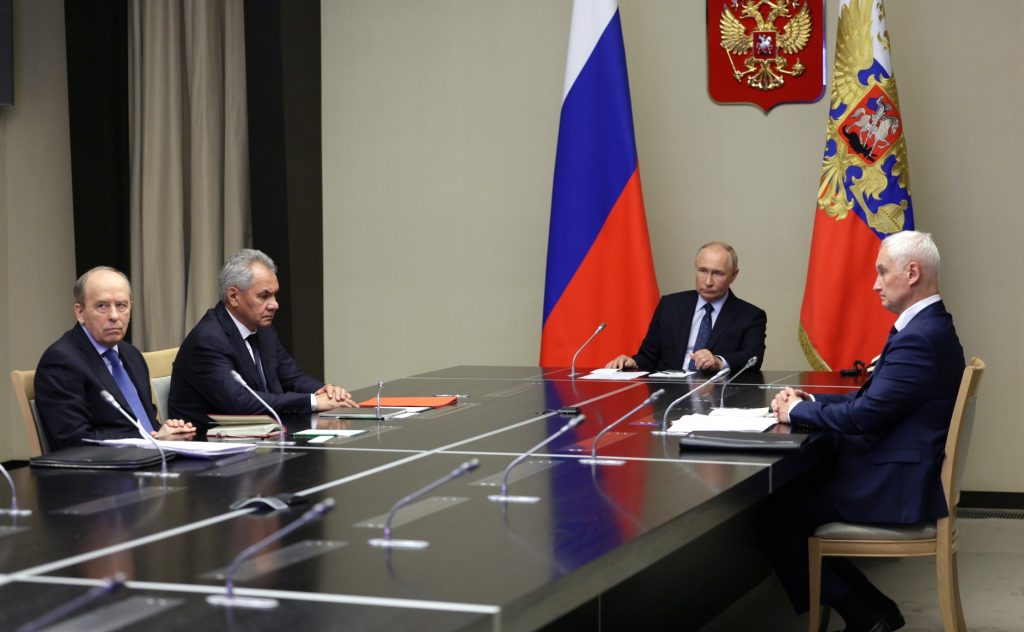
On Wednesday, August 7, Vladimir Putin held a meeting with the heads of law enforcement agencies at the Novo-Ogaryovo residence. The main topic of the meeting was the situation in Kursk region, where the Ukrainian Armed Forces had entered the previous day.
The meeting was attended by Defense Minister Andrei Belousov, Secretary of the Security Council Sergei Shoigu, Director of the Federal Security Service Alexander Bortnikov. The report on the situation in Kursk region was presented by the Chief of the General Staff of the Armed Forces – First Deputy Minister of Defense Valery Gerasimov.
Key points:
- Gerasimov: “At 5:30 a.m. on August 6, units of the Armed Forces of Ukraine numbering up to one thousand people went on the offensive in order to seize a piece of territory in the Sujan district of Kursk region.”
- Gerasimov: “The enemy’s advance deep into the territory in the Kursk direction has been halted by the actions of units covering the state border together with border guards and reinforcement units, air strikes, missile forces and artillery fire.”
- Gerasimov: “At present, units of the North group, together with border guards of the Federal Security Service of Russia, continue to destroy the enemy in areas directly adjacent to the Russian-Ukrainian border. The enemy’s losses amounted to 315 people, including at least 100 [people] killed and 215 wounded. Fifty-four units of armored vehicles, including seven tanks, were destroyed.”
- Gerasimov: “The operation will be completed by defeating the enemy and reaching the state border.”
Outcomes/Predictions:
Putin’s decision not to upgrade the so-called “special military operation” to an “anti-terrorist operation” or to declare a state of war has played a role in the process of keeping calm and order in Russia. They decided to make do with a “counterterrorist operation” in a separate area of the Kursk region. Obviously, there will be conclusions and personnel purges, but after the completion of the operation in Kursk region.
Even the Chief of the General Staff of the Russian Armed Forces, General Gerasimov, who “missed” the offensive, preparing for a different nature of the war, was under attack. In Russia, contradictions between “war correspondents” and generals from the General Staff and the Ministry of Defense intensified. The army began to talk about the need for a change in war strategy and a change in the leadership of the General Staff. That is, in the current situation, the security forces will have to actively reorganize, which is unlikely, given their codependence and sluggishness.
- Vladimir Putin’s telephone conversation with General Secretary of the Central Committee of the Communist Party of Vietnam, President of the Socialist Republic of Vietnam Tho Lam
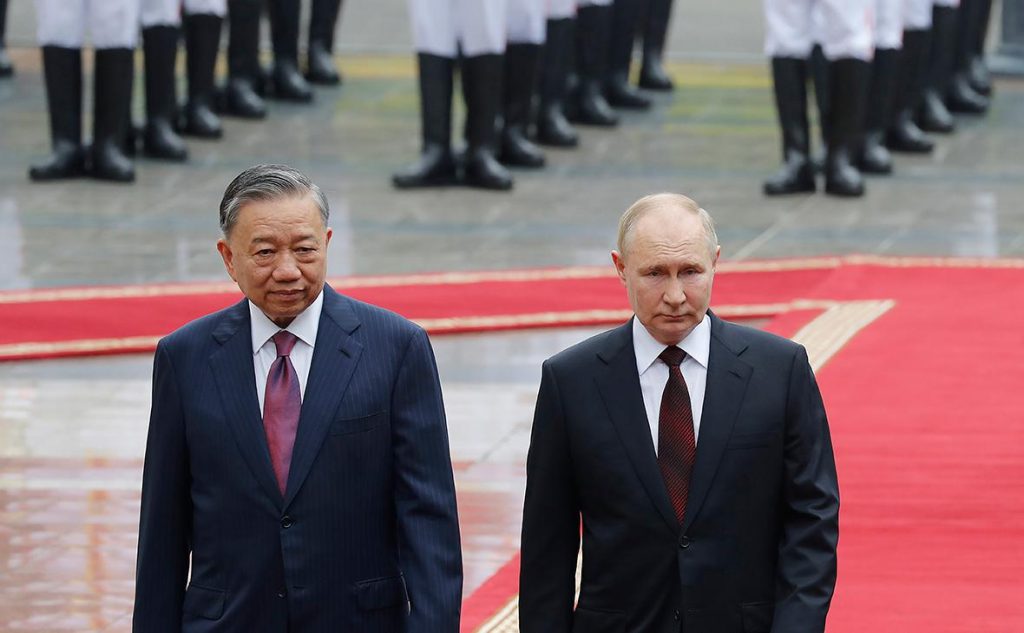
On Thursday, August 8, Vladimir Putin had a telephone conversation with General Secretary of the Central Committee of the Communist Party of Vietnam, President of the Socialist Republic of Vietnam Tho Lam. The official reason for the conversation was congratulating President of the Socialist Republic of Vietnam To Lam on his election as General Secretary of the Central Committee of the Communist Party of Vietnam. It is noted that the Russian President wished him success in party and state activities.
Also, the parties confirmed mutual willingness to further strengthen the comprehensive strategic partnership between Russia and Vietnam, building up bilateral cooperation in various fields.
Outcomes/Predictions:
The phone conversation with Vietnam’s new leader Tho Lam, who came to power as president in May 2024 (amid political scandals with his predecessors) and in late July became General Secretary of the Communist Party of Vietnam (after the death of his predecessor, Nguyen Phu Trong), is not just a courtesy call.
Active economic and political relations are developing between Russia and Vietnam. Vietnam is trying to play a multi-vector game, but is also actively helping Russia in many processes (including media reports that Vietnam is helping to circumvent U.S. energy sanctions). It is important for Russia to realize that after the power in Vietnam suddenly concentrated in the hands of a younger generation of Vietnamese communists, not connected with the USSR (Tho Lam’s predecessor was educated in the Soviet Union), Russian-Vietnamese relations will not undergo negative changes.
- Meeting with Permanent Members of the Security Council
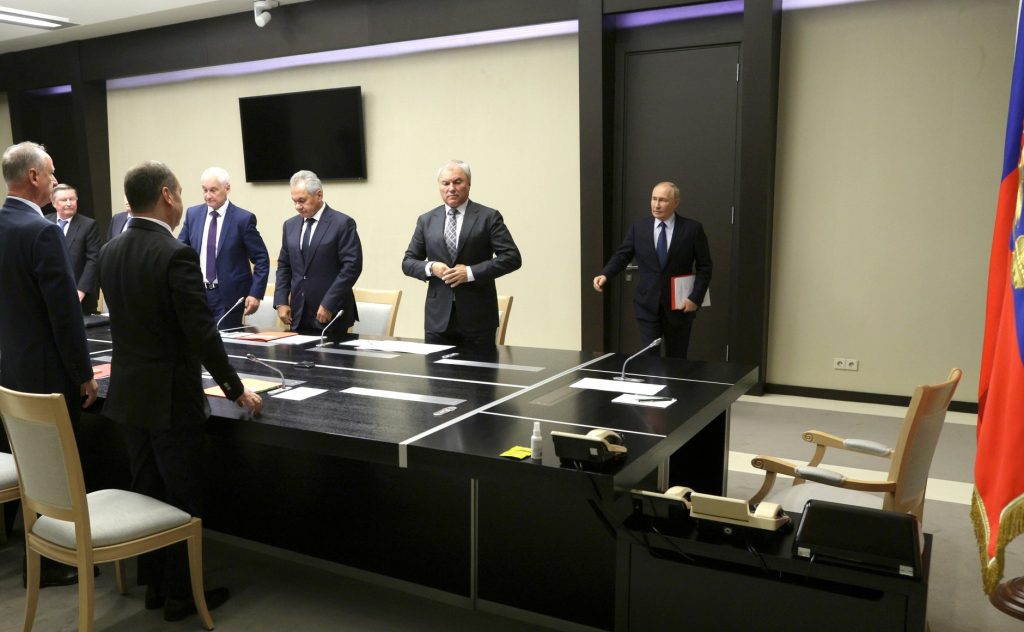
On Friday, August 9, Vladimir Putin held a meeting with permanent members of the Security Council at the Novo-Ogaryovo residence. The main topic of the meeting was the fight against terrorism. It should be noted that at the time of the meeting, the KTO regime had not yet been introduced in the Russian regions bordering Ukraine. Director of the Federal Security Service Alexander Bortnikov was the main speaker at the meeting.
The meeting was also attended by Chairman of the State Duma Vyacheslav Volodin, Deputy Chairman of the Security Council Dmitry Medvedev, Secretary of the Security Council Sergei Shoigu, Defense Minister Andrei Belousov, Director of the Foreign Intelligence Service Sergei Naryshkin, Special Presidential Envoy for Environmental Protection, Ecology and Transport Sergei Ivanov, Presidential Aide Nikolai Patrushev.
Outcomes/Predictions:
In fact, the main topic of the meeting was the events in Kursk Oblast and the possibilities of responding to them – both militarily and diplomatically (in relations with the West). Information regarding this meeting is very limited.
At the same time, it is worth noting that unlike previous similar meetings, which are traditionally held in an online format, this meeting was face-to-face. Moreover, Putin has also held meetings with the chairmen of the State Duma, the Federation Council and members of the government in a face-to-face format. Most likely, this approach is an attempt to demonstrate personal involvement in key processes. Such tactics are already bearing fruit: support for the Kremlin’s actions by Russian citizens remains high and has no critical consequences against the backdrop of the events in Kursk Oblast. It is not excluded that in the near future the Russian president may make a personal visit to the border territories or to the combat zone.
- Oleg Deripaska’s interview for Nikkey Asia
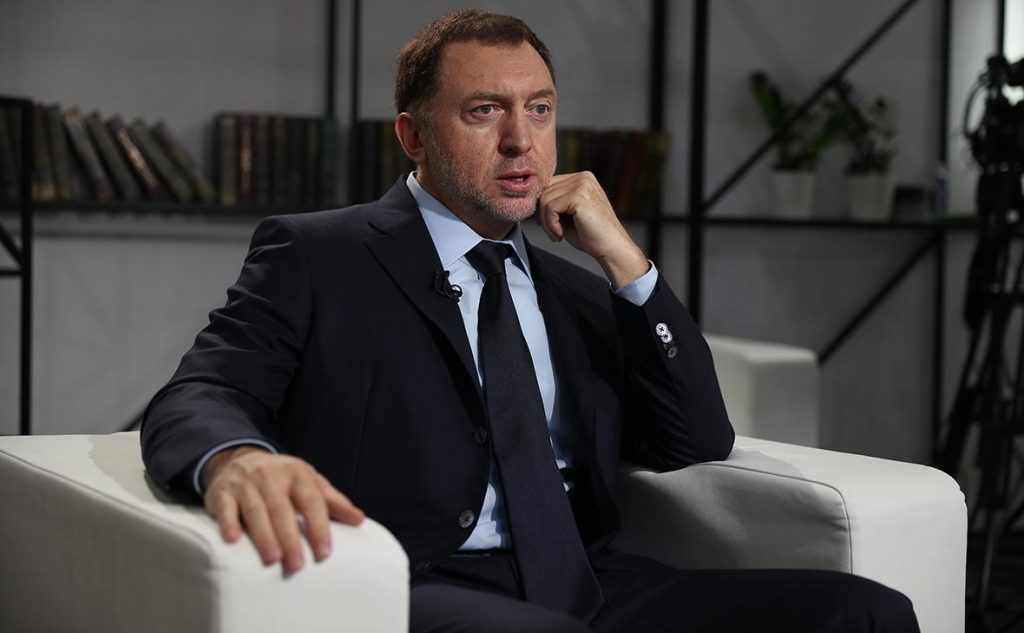
On Thursday, August 8, the website of the Nikkey Asia news outlet published an interview with Oleg Deripaska, a well-known Russian oligarch who is considered one of Vladimir Putin’s closest associates. Deripaska was in Japan on a working visit, during which he represented Russia at a meeting of the APEC Business Advisory Council. In the interview, he voiced his opinion on the prospects for Russia’s trade and economic relations with Asia, trends in trade between Russia and the West, and also touched on Ukraine.
Key talking points:
- “I thought there would be a larger economic downturn. At the beginning of the war [trade with China] was crucial. Now each country is only doing what it thinks is right,” Deripaska said, praising what he called “very real discussions” on “the importance of sanctions control” by India, which hosted the G-20 summit last September. The group’s final statement did not explicitly condemn Russia’s invasion of Ukraine.
- “If you want to stop the war, first you have to have a ceasefire,” he said, calling for an “immediate, unconditional ceasefire” in Ukraine.
- Asked about his current relationship with Putin, Deripaska declined to say whether it was close. “There is no change,” he said, without elaborating. “They [the Kremlin] don’t touch me, we don’t touch politics,” he said, emphasizing his role as a businessman.
Outcomes/Predictions:
Oleg Deripaska has been a consistent critic of the current war in Ukraine. Having Ukrainian roots, he has repeatedly tried to act as a mediator to resolve the conflict, but unsuccessfully (in this he is inferior to Roman Abramovich). Not so long ago Deripaska voiced a version according to which the war in Ukraine will end only in May 2025. The current interview is quite revealing: Deripaska calls for a ceasefire and the start of negotiations. He also makes it clear that he is ready for economic expansion in the East, and he has promising plans for business development in the Pacific region.
Of course, such statements and appeals should be considered in the context of not so much personal opinion, but the position of a certain part of the elites, which have a serious influence on political processes inside Russia. Will the Kremlin react to this? Unambiguously yes. Especially since such a message has been voiced with the help of foreign media (in this case, Japanese media), oriented both to Asia and to Western audiences. However, the question is what exactly the reaction will be.

